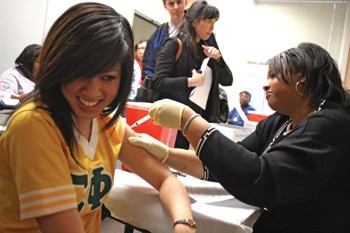
Memorial Health Center is overwhelmed with flu cases. (Stuart Palley)
Students returning to school from winter break brought more with them than their winter clothes; they also brought the influenza virus to campus.
SMU is experiencing one of the worst flu outbreaks in years. Last week the health center treated over 60 students for the flu, and dozens more started off this week according to Health Educator Megan Knapp.
Chief Epidemiologist of the Dallas County Department of Health Wendy Chung said the flu outbreak in Dallas is not above the normal levels, but it is not uncommon to see small outbreaks on college campuses.
“On campus you have a lot of people in close quarters; people living in dorms two or three to a room can contribute to the spread of the virus relatively easily,” Chung said.
To help stem the spread of the virus the Health Center has launched an active campaign to help vaccinate students. The Dallas County Department of Health has provided enough flu vaccines for the health center to give them free of charge to students through Tuesday.
Knapp said that on the first day of free vaccinations over 350 students lined up to receive their flu shot. One flu shot distribution point in the commuter lounge had the line stretching nearly into the Hughes-Trigg hallway.
The health center also has, in limited supply, the Flu Mist nasal spray. It is available for $50 and can be charged to student accounts. The nasal spray is fast acting – building immunity in 24 hours compared to the two weeks it takes normal vaccinations.
Chung said that the vaccination is the best protection an individual can get from the virus.
“The vaccination provides approximately 87 percent efficacy of prevention, and if you are in the minority of those that get the virus it lessens the severity and duration for the individual. It can take up to two weeks to build the immunity from a vaccination however,” Chung said.
Other distribution points are in the Umphrey Lee building near the dining center and the health center as well. Hours of distribution are 9 a.m. to 4 p.m.
The Health Center is also encouraging students to take many preventative measures according to Knapp.
“The first step is to practice good hygiene habits,” Knapp said. “Washing your hands with soap and water can go along way to preventing the flu.”
Knapp added that if you are sick, covering your cough by coughing into your sleeve could prevent the spread of the virus. She said that at the first sign of the illness you should see a doctor as certain medicines started at the beginning of the virus can shorten the course of the disease.
She added that if you are sick, it would be a good idea to stay home from class to rest and prevent the further spread of the virus.
Real Food on Campus is trying to help stop the outbreak as well. The cafeteria started a program in which roommates or friends can get a “to-go” meal for sick students. The meals are available during regular dining hours, and just require the ID card of the sick student with a meal plan.
The cafeteria stressed the importance of eating while your body is attempting to heal. It asked that if you are sick, to follow your doctor’s dietary recommendations.
Knapp also addressed the rumor that has been circling campus that if the outbreak affects enough students that classes will be cancelled. She said that the influenza virus is not really life threatening, and it would be “unlikely” that classes would be canceled.








